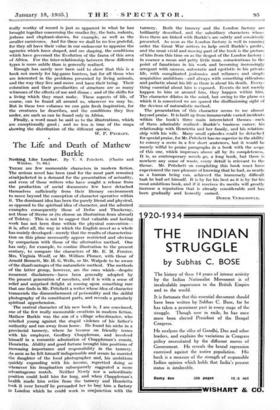- The - Life and Death of :Mathew
Burkle
THERE are few memorable characters in modern fiction. The serious novel has been (and for the most part remains) straitjacketed in a demand for the presentation of actuality, and even of those writers who have sought a release from the production of social documents few have detached themselves sufficiently from their literary environment to move beyond the conception of character operative within it. The dominant idea his been the purely literal and phySical, as opposed to the spiritual idea of character, and the admired examples consequently those of Defoe and Thackeray, not those of Sterne Or (to choose an illustration from abroad) of Tolstoy. This is not to suggest that valuable and lasting work has not been &One within the physical convention— it is; after all, the way in which the English: novel as a whole has mainly developed—merely that the results of characteriza- tion 'on this plane necessarily appear restricted and obvious by comparison with those of the alternative method; One has only, for example, to confine illustration to the present century, to compare the characters of Mr. E. M. Forster, Mrs. Virginia Woolf, or Mr. William Plomer, with those of Arnold Bennett, Mr. IL. G. Wells, or Mr. Walpole to be aware of the disadvantages of the naturalistic method. The methods of the latter group, however, are the ones which—despite recurrent disclaimers—have been generally adopted by the present generation of novelists, and it is with a sense of relief and surprised, delight at coming upon something rare that one finds in Mr. Pritchett a writer whose idea of character transcends the dismemberment of personality and the skilful photography of its constituent parts, and reveals a genuinely spiritual apprehension.
The central character of his new book is, I am convinced,
iioozcein modern father's oreue of thyeofiew really memthoeras:tbluepcidreaxt, Mathew Burkle was the sbn of a village. schoolniaster, who authority and ran away from home. He found his niche in a provincial tannery, where he became on friendly terms with his employer, Geoffrey Chappleman, and involved himself in a. romantic admiration of Chappleman's cousin, Henrietta. Ability and good fortune brought him positions of increasing importance and responsibility in the tannery. As soon as he felt himself indispensable and secure he married the daughter of the local photographer and; his ambitions quickly. expanding with his Income, regretted doing- so whenever his imagination subseqUently auggested a more advantageous Match. Neither Newly nor a suboMinate position could hold him for long, and when ChapPlenuin4s health made him retire from the tannery and Henrietta took it over herself he persuaded her to bey him a factory in London which he could work in conjunction with' the
tannery. Both the tannery and the London factory are brilliantly described, and the. subsidiary characters whose lives there are linked with Burkle's are subtly and sensitively presented. As soon as the London factory is well in running order, the Great War arrives to help swell Burkle's profits; and the most vivid and moving part of the book is the picture of him from this time on as the despot of the London factory : in essence a mean and petty little man, conscientious to the point of fanaticism in his work and becoming increasingly arrogant with success, autocratic and egotistic in his private life, with complicated jealousies and reliances and simple acquisitive ambitions—and always with something ridiculous and pathetic about his life as there is about his death. Every- thing essential about him is exposed. Events do not merely happen to him or around him, they happen within him. The character dilates in the mind, but owing to the plane on which it is conceived we arc spared the disillusioning sight of the devices of naturalistic method.
The' presentation of this character seems to me almost beyond praise. It is built up from innumerable varied incidents within the book's three main interrelated themes—each of them admirably realized—Burkle's business career, his relationship with Henrietta and her family, and his relation- ship with his wife. Many small episodes could be detachel for special praise, for Mr. Pritchett has no superior in the ability to convey a scene in a few short sentences, but it would be merely wilful to praise paragraphs in a book with the scope of this one, which impresses above all by its completeness. It is, as contemporary novels go, a long book, but there is nowhere any sense of waste, every detail is relevant to the theme. Mr. Pritchett on completing this book must have experienced the rare pleasure of knowing that he had, as nearly as a human being can, achieved the immensely, difficult task he had set himself. It is by far his best as it is by far his most ambitious book, and if it receives its merits will greatly increase a reputation that is already considerable and has been gradually and honestly earned.
DEREK VERSCROYLE.






































 Previous page
Previous page